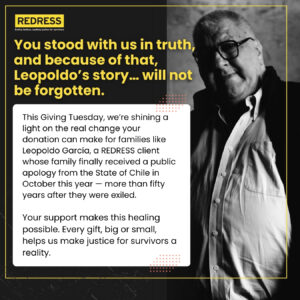Publications
REDRESS’ publications are also available in hard copy format. Please contact us for further information on [email protected].
In this submission, REDRESS comments on some of the Issues for consideration of the Committee against Torture in its examination of the UK’s 5th State Party Report. Some of REDRESS' concerns are direct consequences of the UK’s counter-terrorism policies, particularly the role of the security services, along with the conduct of the armed forces in Iraq and in Afghanistan, which have damaged the UK’s credibility as a State committed to the eradication of torture, and risk undermining the positive steps it has taken to advance the anti-torture agenda worldwide.
From 13-14 April 2012, in the margins of the NGO Forum preceding the 51st Ordinary Session of the African Commission on Human and Peoples’ Rights (ACHPR), lawyers and other experts met in Kololi, The Gambia, to discuss victims’ experiences of accessing justice and seeking reparation. Participants included lawyers and experts from Algeria, Burundi, Ivory Coast, Chad, the Democratic Republic of Congo, Ethiopia, Kenya, Libya, Rwanda, Sierra Leone, South Africa, Sudan and Zimbabwe. Participants explored challenges and potential solutions in accessing justice at the national, (sub-) regional and international levels. Their presentations and discussions form the basis of this paper.
This report considers torture and ill-treatment in Bahrain after the implementation of the reforms that were recommended by the Bahrain International Commission of Inquiry (BICI) following serious human rights violations committed by State agents after the February protests of 2011. The report draws on the past experiences of REDRESS and IRCT in the country and their joint mission to Bahrain in April-May 2012, which involved the medical documentation of cases of alleged torture and ill-treatment. The report concludes that torture and ill-treatment continue, and that obligations towards victims have not been met.
Our annual report for 2013 provides an overview of the work that REDRESS undertook from 1 April 2012 to 31 March 2013.
Lawyers for Justice in Libya (LFJL), REDRESS, DIGNITY and the World Organization against Torture (OMCT) provided these preliminary comments on the Draft Law Criminalising Torture, Enforced Disappearances and Torture in Libya, which was approved on 9 April 2013. The Draft Law attempts to criminalise three distinct crimes either fully (the first two) or partially (the third) recognised in international treaties: torture, enforced disappearances and discrimination. An issue of concern for the organisations is that by attempting to address these three significant human rights crimes in one piece of legislation, the law risks confusing or oversimplifying the specific obligations they impose. Another shortcoming in the law is the narrow definition of torture in it, which is not in accordance with the UN Convention Against Torture, to which Libya is a State party.
The Victims Rights Working Group (VRWG), a network of civil society groups and experts informally facilitated by REDRESS, shared these remarks ahead of discussions on the issue of intermediaries, which took place in the context of the Facilitation on Victims and Affected Communities and Trust Fund for Victims, including reparations, on 13 March 2013 in The Hague.
REDRESS made these observations to the Board of the Trust Fund for Victims in light of the International Criminal Court's first decision on reparations in the case of The Prosecutor v Thomas Lubanga, rendered on 7 August 2012. The observations focus on the Trust Fund’s mandate in relation to reparation, exploring issues concerning how implementation of reparations fits into the Court’s overall mandate.
This report was submitted to the United Nations Human Rights Committee in March 2013. It concludes that measures taken by Peru to prevent and combat torture have been inadequate. This includes the lack of a national registry of complaints for acts of torture or cruel, inhuman or degrading treatment, the lack of effective investigations, and the lack of prosecutions for torture. A number of factors contribute to this worrying trend such as the lack of protection for victims, and the lack of independence and impartiality of investigations into torture. As highlighted in this section, victims of torture in Peru have not received adequate reparation. This also applies to Peru’s administrative reparation programme which, among other issues, fails to take into account the individual circumstances of each victim’s case.


